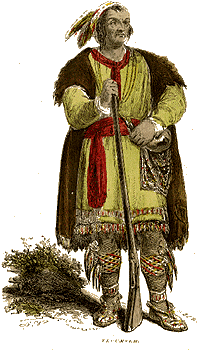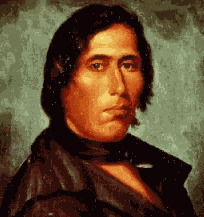|
|
Tecumseh

1768?-1813, chief of the Shawnee , b. probably in Clark co., Ohio. Among his people he became distinguished for his prowess in battle, but he opposed the practice of torturing prisoners. When the United States refused to recognize his principle that all Native American land was the common possession of all the Native Americans and that land could not rightly be ceded by, or purchased from, an individual tribe, Tecumseh set out to bind together the Native Americans of the Old Northwest, the South, and the eastern Mississippi valley. His plan failed with the defeat of his brother, the Shawnee Prophet, at Tippecanoe (1811). Though Tippecanoe was, properly speaking, a drawn battle, it marked the collapse of the Native American military movement. In the War of 1812, Tecumseh allied himself with the British and was made a brigadier general. He led a large force of Native Americans in the siege of Fort Meigs, covered Gen. Henry Procter's retreat after the American victory on Lake Erie, and lost his life in the battle of the Thames, in which Gen. William Henry Harrison overwhelmed Procter and his Native American allies. Tecumseh had great ability as an organizer and a leader and is considered one of the outstanding Native Americans in American history. See biographies by Benjamin Drake (1841, repr. 1969), J. M. Oskison (1938), and Glenn Tucker (1956, repr. 1973); C. F. Klinck, Tecumseh: Fact and Fiction in Early Records (1961); A. W. Eckert, The Frontiersmen (1967).
An American Hero: Tecumseh - Provides a brief biography of Tecumseh and accounts of his death. Tecumseh - Life story and times of the chief of the Shawnee who worked to form an Indian nation. Tecumseh - Ohio Historical Society - Organization features a brief profile of this Shawnee chief with portraits and links to related histories and biographies. Tecumseh's Speech at Vincennes - Text of Tecumseh's speech to Governor Harrison at Vincennes in 1810.
 |
|
|
|
|
 Native American Nations
Native American Nations
